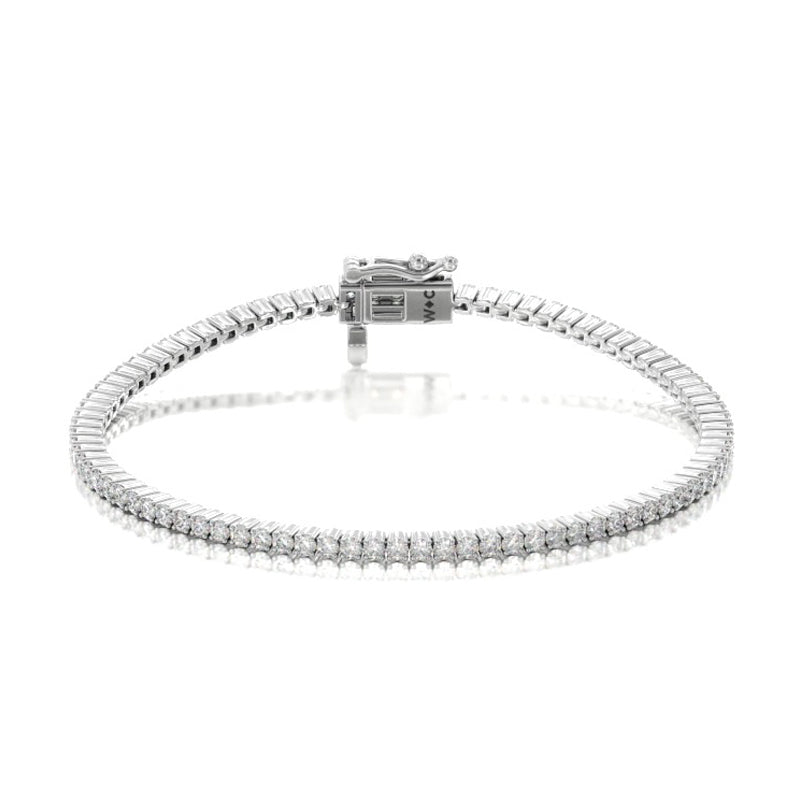Your Bag
Your cart is currently empty
Free Shipping
Buy Now Pay Later
100% Secure Checkout
Use code FIRST10 for 10% OFF on first order *on regular priced items.
Your cart is currently empty
Free Shipping
Buy Now Pay Later
100% Secure Checkout
Use code FIRST10 for 10% OFF on first order *on regular priced items.


Diamond bracelets are a classic, timeless piece of jewelry that won’t ever go out of style. It’s one reason that diamond bracelets are a popular fine jewelry option all over the world. Lab diamonds have made diamond jewelry more accessible for all by providing the brilliance and beauty of earth-mined diamonds at a relatively affordable cost.
Another benefit to purchasing lab diamond bracelets is that they’re versatile pieces. You can wear them alone or purchase several to stack. You can also find lab diamond bracelets in various styles as well: infinity bracelets, tennis bracelets, and bangles.
There is a knack to stacking bracelets. In general, do not cover more than a third of your forearm with bracelets. First, take a look at the sizes of bracelets. If you have thinner lab diamond bracelets, you can wear more bracelets. If you want to stack larger pieces, then three to five is a good rule of thumb. If you’re wearing larger pieces, don’t overshadow the smaller bracelets that you’re stacking. Remember you can always mix and match metals, textures, and styles of bracelets. For example, you can mix in a leather cuff or a watch along with your lab diamond bracelets.
If you have a jewelry lover in your life, lab-made diamond bracelets make a great gift for a special occasion, like a birthday or holiday present. They’re a circle symbolizing the infinite amount of love you have for one another. And they can be worn by men and women. You can also purchase a bracelet for yourself–you deserve to treat yourself.
If you’re buying a lab-diamond bracelet, keep the following points in mind:
Clean your lab diamonds periodically to remove dirt and debris that can build up over time. To clean your lab diamond bracelets, use mild soap (dish soap works well because it breaks up dirt that can make diamonds appear cloudy or dull) mixed with warm water and a soft toothbrush. Soak your bracelet for 10 to 20 minutes, and then gently scrub your bracelet with the toothbrush under warm running water.
Store your lab diamond bracelets separately in a softly lined jewelry box to protect other jewelry from scratches from your diamonds. You also don’t want the metal from your bracelet to get scratched from other pieces of jewelry either.

Three Prong Lab Diamond Tennis Bracelet
starting at:$1,650

Three Prong Natural Diamond Tennis Bracelet
starting at:$4,250

Four Prong Lab Diamond Tennis Bracelet
starting at:1,600

Four Prong Natural Diamond Tennis Bracelet
starting at:$4,250

Bezel Lab Diamond Tennis Bracelet
starting at:$2,250

Bezel Natural Diamond Tennis Bracelet
starting at:$4,400
Who certifies lab diamonds?
Both the IGI and GIA certify lab diamonds. IGI provides specific gradings for qualities like color and clarity. The GIA has started fully grading lab-created diamonds recently, but GIA-rated lab diamonds are harder to find.
Are lab diamonds sturdy enough for everyday wear?
Yes, lab diamonds, like natural diamonds, are hard stones that are perfect for everyday wear. Both lab and natural diamonds have the same chemical composition, optical properties and physical features as natural diamonds.
How many bracelets should you wear while stacking?
Generally, don’t cover more than a third of your forearm with bracelets. Stacking depends on the size of bracelets that you’re stacking. For thinner bracelets, you can wear many. If you’re stacking larger bracelets along with a watch, consider wearing three to five total. If you’re mixing bracelet widths, stick to the ratio of one larger bracelet for every 2 to 3 thinner bracelets. it.
Can you mix metals while stacking bracelets?
Yes, you can mix metals while stacking bracelets. Rose and yellow 14K gold go well with white gold and platinum. You can have a monochromatic bracelet look or a mixture of metals. Either looks great!